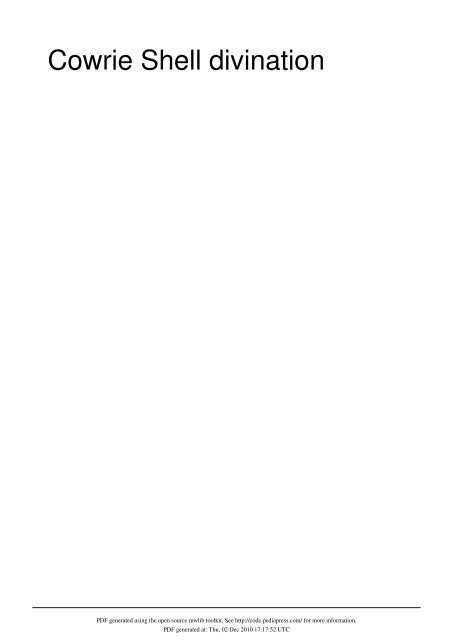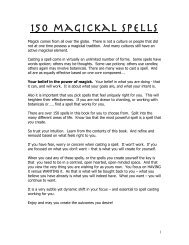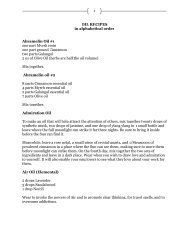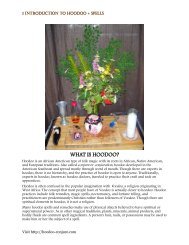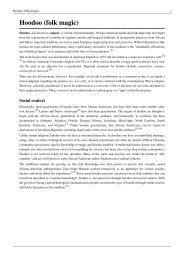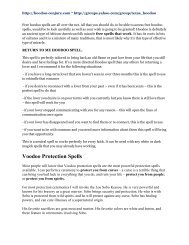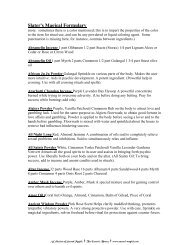Cowrie Shell divination - Hoodoo-Conjure
Cowrie Shell divination - Hoodoo-Conjure
Cowrie Shell divination - Hoodoo-Conjure
Create successful ePaper yourself
Turn your PDF publications into a flip-book with our unique Google optimized e-Paper software.
<strong>Cowrie</strong> <strong>Shell</strong> <strong>divination</strong><br />
PDF generated using the open source mwlib toolkit. See http://code.pediapress.com/ for more information.<br />
PDF generated at: Thu, 02 Dec 2010 17:17:52 UTC
Contents<br />
Articles<br />
Ifá 1<br />
Merindinlogun 7<br />
References<br />
Article Sources and Contributors 8<br />
Image Sources, Licenses and Contributors 9<br />
Article Licenses<br />
License 10
Ifá 1<br />
Ifá<br />
Sixteen Principal Odu<br />
Name 1 2 3 4<br />
Ogbe I I I I<br />
Oyẹku II II II II<br />
Iwori II I I II<br />
Odi I II II I<br />
Irosun I I II II<br />
Iwọnrin II II I I<br />
Ọbara I II II II<br />
Ọkanran II II II I<br />
Ogunda I I I II<br />
Ọsa II I I I<br />
Ika II I II II<br />
Oturupọn II II I II<br />
Otura I II I I<br />
Irẹtẹ I I II I<br />
Ọsẹ I II I II<br />
Ofun II I II I<br />
Sixteen Principal Afa-du<br />
(Yeveh Vodou)<br />
Name 1 2 3 4<br />
Gbe-Meji I I I I<br />
Yeku-Meji II II II II<br />
Woli-Meji II I I II<br />
Di-Meji I II II I<br />
Abla-Meji I II II II<br />
Akla-Meji II II II I<br />
Loso-Meji I I II II<br />
Wele-Meji II II I I<br />
Guda-Meji I I I II<br />
Sa-Meji II I I I<br />
Lete-Meji I I II I<br />
Tula-Meji I II I I<br />
Turukpe-Meji II II I II<br />
ka-Maji II I II II<br />
Ce-Meji I II I II
Ifá 2<br />
Ose orogbe II I II I<br />
Fu-Meji II I II I<br />
In traditional Yoruba culture, Ifá refers to a system of <strong>divination</strong> and the verses of the literary corpus known as the<br />
Odú Ifá. Orunmila is the deity associated with Ifa diviniation. In some instances, the name Orunmila is used<br />
interchangeably with the word Ifa. Orunmila is claimed to have brought Ifa <strong>divination</strong> to the world.<br />
This article sometimes uses the word "Yoruba" to refer to a system of traditional spiritual practices, as well as<br />
modern day practitioners. This use does not refer to the Yoruba people. Not all Yoruba people practice this system,<br />
although the tradition originates from their culture. The best descriptor would be "Ifa/Orisha tradition."<br />
Ifá originated in West Africa among the Yourba groups as a form of traditional African medicine. It is also practiced<br />
among believers in Lucumi, (sometimes referred to as Santería), Candomblé, West African & Diaspora Vodou, and<br />
similarly transplanted Orisa'Ifa lineages in the New World. In Togo, it is known as Afa, where the Vodou deities<br />
come through and speak. In many of their Egbes, it is Alaundje who is honored as the first Bokono to have been<br />
taught how to divine the destiny of humans using the holy system of Afa. The Ifa Divination system was added in<br />
2005 by UNESCO to its list of "Masterpieces of the Oral and Intangible Heritage of Humanity".<br />
The Yoruba <strong>divination</strong> system enabled diviners to invoke the teachings of Orunmila, the Yoruba deity of wisdom,<br />
prophecy and ethics. Esu (Eshu), who is seen as being in charge of justice and the transportation of ebos, is said to<br />
lend his authority (ase) to the oracle to clarify the issues and provide direction. Ifa <strong>divination</strong> rites are claimed to<br />
provide an avenue of communication to the spirit world.<br />
Performing Ifa <strong>divination</strong> is called idafa (or dida owo and ounte ale). Idafa is performed by a Babalawo or Iyanifa<br />
(an initiated priest or priestess). Babalawo can be translated as "father of the secrets" while "Iyanifa" means "mother<br />
that has Ifa(i.e. its blessing)". The babalawo or iyanifa provides insights about the current circumstances impacting<br />
the life of a person requesting this information and provides any necessary information to aid the individual. Awo is<br />
a reference for devotees in Orisa worship. It includes Babalawos, Iyanifas, Babalorishas, Iyalorishas and even<br />
uninitiated devotees.<br />
Initiation into Ifa requires rigorous study. An aspiring Babalawo must learn AT LEAST four verses from each of the<br />
256 chapters (Odu) of Ifa. The minimum of four verses will of necessity include ebos and ooguns (medicine) that are<br />
embedded and relevant to each of the verses, plus other issues that complement <strong>divination</strong>. An accomplished<br />
Babalawo must know about ten verses of each of the 256 chapters of Ifa (256 Odu Ifa). Regardless of gender,<br />
whoever aspires to practice Ifa must have this qualification. In essence, Ifa practice does not preclude a woman<br />
provided such woman acquires the required qualification. Odu—a special Orisa—can only be received by a<br />
Babalawo who decides to perform the special initiation that will allow him access to Odu. In essence, initiation into<br />
Ifa is the first step towards initiation into Odu. A woman cannot be initiated into Odu. Character Traits of a Awo:<br />
Orunmila demands humility from his priests and priestesses, therefore, a Babalawo should be an embodiment of<br />
patience, good character, honesty, and humility. Apetebi is the term for a Babalawo’s wife. No initiation is required<br />
for apetebi title because it comes with being married to a Babalawo. Iyanifa is a title and not the opposite term of<br />
Babalawo.
Ifá 3<br />
Divination process<br />
Special instruments are used to assist in the<br />
<strong>divination</strong> to transcribe Orunmila's wisdom<br />
through the diviner. The items used for<br />
<strong>divination</strong> include:<br />
• a group of sixteen Ikin, commonly<br />
known as palm nuts, which are used to<br />
create binary data<br />
• Dust from the Irosun tree (Iyerosun)<br />
• a vessel for the seeds (Ajere Ifa)<br />
• a <strong>divination</strong> tray (opon Ifa).<br />
• a tapper instrument (iroke Ifa)<br />
• a fly whisk (Irukere Ifa)<br />
• beaded belts for the babalawo/iyanifa to<br />
wear (this is not required)<br />
• another form of <strong>divination</strong> is with the<br />
Opele, though Ikin is considered superior<br />
Tray and palm nuts<br />
The (opon Ifa) or tray and (iroke Ifa) or tapper are used in Ifa <strong>divination</strong>, a central ritual within Ifa tradition. This<br />
tray, adorned with carved images and dusted with powder, serves as the template on which sacred signs (odu) related<br />
to the personal concerns of a diviner's client are traced as the point of departure for analysis. In contrast to those<br />
transitory signs, the more permanent backdrop of the carved motifs on the tapper and tray constitutes an artistic<br />
exegesis of the forces that shape human experience and the universal needs fulfilled by such quests for<br />
enlightenment.<br />
To initiate the ritual, the babalawo/iyanifa places the tray in front of him and taps rhythmically on it with the pointed<br />
end of the tapper, invoking the presence of Orunmila, past diviners, and other Orisa.<br />
There are a variety of palm nuts that are available, but only specific kinds may be used for Ifa <strong>divination</strong> and must<br />
have at least 3 "eyes" or more. The palm nuts are grouped in one hand, then the diviner attempts to shift them all to<br />
his/her other hand at once, and counts the remaining Ikin left, hopefully to discover that either one or two remain.<br />
(Odu, which are the foundation of the binary data, can only be marked with either one or two palm nuts, remaining<br />
in the diviner's original hand. As this process goes on, the diviner marks single or double marks in wood powder<br />
spread on his <strong>divination</strong> tray until he or she has created one of the 256 odus that are available.<br />
Each of these odus is associated with a traditional set of Ese (verses), often relating to Yoruba mythology, which<br />
explain their divinatory meaning. These verses represent thousands of years of observation and are filled with<br />
predictions, and both mundane and spiritual prescriptions that resolve issues found in that Odu. Within Ifa, Believers<br />
find all the knowledge of the world past, present. and future.<br />
After obtaining the Odu that governs a situation or event, the diviner then determines whether the Odu comes with<br />
Ire (which is poorly translated to mean good luck) or Ibi (which could be viewed as obstacles or impediments to<br />
success). After this process the diviner now determines appropriate offerings, spiritual disclipines and/or behavioral<br />
changes necessary to bring, keep or compel success for the person receiving divinatory counsel.
Ifá 4<br />
Odù Ifá<br />
There are sixteen major Odu ('books') in the Odù Ifá [1] literary corpus. When combined there are total of 256 Odu<br />
believed to reference all situations, circumstances, actions and consequences in life based on the uncountable ese<br />
(poetic recitations) attached to the 256 Odu coding. These form the basis of traditional Yoruba spiritual knowledge<br />
and are the foundation of all Yoruba <strong>divination</strong> systems.<br />
Where I is an odd count or a "heads" result, and II is an even count or a "tails" result, the sixteen basic patterns and<br />
their Yoruba names are set forth in the sidebar (please note this is only one way of ordering them, this changes<br />
depending on area within Nigeria, or the diaspora. An alternative order used in Ibadan, and Cuba is: Ejiogbe,<br />
Oyekun meji, Iwori Meji, Idi Meji, Irosun Meji, Oworin Meji, Obara Meji, Okanran Meji, Ogunda Meji, Osa Meji,<br />
Ika Meji, Oturupon Meji, Otura Meji, Irete Meji, Oshe Meji, Ofun Meji. Heepa Odu! This is important to note as it<br />
changes the outcomes of certain parts of the reading).<br />
The babalawo recites a series of poems with proverbs and stories from the Ifa poetry that go with that choice. The<br />
final interpretation is made by the person seeking guidance, who decides how the verses that the babalawo has<br />
recited should be applied to the problem at hand. (This may be one style, however other schools of thought with Ifa<br />
have the Diviner interpreting what Ifa says and not simply chanting and leaving it to the client) Though the number<br />
of symbols is different, the Chinese I Ching <strong>divination</strong> system also bears some resemblance to Ifa <strong>divination</strong>. Like<br />
the I Ching, Ifa combines a large body of wisdom literature with a system for selecting the appropriate passages from<br />
it. Unlike the I Ching, however, Ifa poetry is not written down but passed down orally from one babalawo to<br />
another. Today, there are many texts that are designed to help Babalawos to learn and retain the huge corpus of<br />
knowledge. Additionally, Odu Ifa is different from iChing in that it is considered to come from a specific divinity<br />
and only trained, initiated priests are allowed to divine and interpret within this system. Finally, I Ching has a total of<br />
64 (8x8 trigrams, or 4^3) possible permutations, while Odu's 16 books form a total of 256 (16^2, or 4^4).<br />
Vocabulary<br />
• Babalawo or Awo Ifa. Male Ifa Priest<br />
• Awo Alatese [2] . This group of Awo have their own specialization within Ifa, mastering the aspects of Ifa<br />
preparations [2] and cures etc<br />
• Bokono/Bokonon. (male/female) Priest of Afa/Vodoun<br />
• Obomila.(male) priest of Iha/Ifain Benin<br />
• Ohen.(male or female)Diviner and Priest<br />
• Amengansie. Female oracle priest of Afa/Vodoun (matrilineally inherited).<br />
• Akapo. Contrary to common diasporan belief, this is NOT another name for a Babalawo. Rather, it refers to a<br />
Babalawo's apprentice who carries the bag (apo in yoruba) containing the Babalawo's divining instruments and<br />
related materials.<br />
• Iyanifa. Female Ifa Priest, can also be a title within an Ifa community or temple, can also be used to identify a<br />
woman proficient in the use of 16 cowrie divintion (Ifa) of Osun or Olokun, thus Iya ni Ifa, mother who has the<br />
knowledge of Ifa, she may also know how to recite Ifa even as a child video seen here [3]<br />
• Dida Obi. casting kola nuts of 4 or more pieces.<br />
• Dida Owo. casting cowrie shells.<br />
• Ifa Dida [1] . (meaning Ifa Divination), casting of Ifa on Opon Ifa<br />
• Ohunte Ale. Inscribing or marking Odu on the Opon Ifa<br />
• Opon Ifa. Divining tray of Ifa, used by a Babalawo<br />
• Oròrò Ifá [4] . Narration or declaration during the <strong>divination</strong> or during the advisement following <strong>divination</strong><br />
• Ifa Rere. Moral Character - Ethics within Ifa<br />
• Ifa Pele. Gentle Character - Ethics within Ifa
Ifá 5<br />
• Orunmila. Prophet that developed and spread Ifa <strong>divination</strong> system. Orunmila is second only to<br />
Olodumare/Olorun (God, Supreme Being), and is without earthly lineage. He embodies the principles of Ifa.<br />
• Orisa. Primordial energies from which all living things emanate; The Deities that represent various manifestations<br />
of God, Olodumare.<br />
• Iya Nla. Ìyá àgbà, The bearded woman, the Womb of Creation, Womb of existence, the fearful power, the Mother<br />
of the closed calabash, the Mother of the gourd, who teach humankind through Awon Iya Wa how to acquire the<br />
cosmic knowledge to understand life, balance and the harmony on their life.<br />
• Irunmole. The Primordial deities, first sent to earth to make the world habitable for humankind, also the full<br />
spectrum of deities (Orisa) created by Olodumare (the Creator) for worship and veneration numbering 400+1 as<br />
an infinite number of natures manifestation and recreation, also differs from Orisa yet some Irunmole are Orisa as<br />
explained here [5]<br />
• Dafa. means to cast Ikin Ifa (sacared holy palm kernel) for <strong>divination</strong> purpose and divine direction in life<br />
• Apetebii. is the wife of a Babalawo AND / OR the wife of a Babalawo Ikin Ifa, she is one of the few titled<br />
positions within the Yoruba tradition and holds an important position within the tradition and culture, she will<br />
assist her husband in the worship and appeasement of his Ifa, and help to teach children the fundaments of<br />
worshipping Ifa as a philosophy. This is not simply a title, but has accompanying initiations that must be<br />
performed to hold this title. Can also be referred to as Iyanifa interchangeably.<br />
• Ayafa. very similar to the Apetebi and can also be Apetebi, but this wife is often "married" to the Ifa of a<br />
Babalawo and can also be married to another man, or even a female child before marriage age or the girl child of<br />
a Babalawo who by "marrying" to Ifa, this is a symbolic ceremony and will convey certain blessing and<br />
protection to the female.<br />
• Itefa or Itelodu. is the ritual process of performing ones initiation rites of passage, to determine ones purpose or<br />
destiny. It is important to note that performing Itefa alone does not make one to be considered Babalawo nor<br />
Iyanifa, Itefa is one of many steps of apprenticeship to become a Babalawo (diviner/healer/counsellor)<br />
• Ifá. Another name for the orisa (deity) Orunimla. Orunmila / Ifá is the orisa of wisdom and knowledge, and so<br />
during the ritual of <strong>divination</strong> a 'client' is said to 'consult Ifà'. 'Ifá' is also the name of the <strong>divination</strong> ritual itself<br />
and of the specific verses in the Odu Ifá (the sacred texts in the Yoruba literary corpus) given to the priest by the<br />
palm nuts in <strong>divination</strong>.<br />
Names<br />
Ifa priests and worshippers among the Yoruba people or those who believe in Ifa bear names related with Ifa,<br />
typically, but not necessarily, begin with the word, ‘Ifa’, like Ifadairo, Ifabiyi, Ifadare, Ifabunmi, etc. The first "I" in<br />
these names may be omitted to form Fadairo, Fabiyi, Fadare, Fabunmi, Falola, etc. The prefix "Awo" is also used in<br />
names ascribing Ifa or its priesthood - Awolalu, Awodele, Awolowo, Awosika, etc.<br />
Audio & Video<br />
• EkoFa Podcast [6] also an iTunes podcast<br />
• Babalawo in Nigeria performing traditional Ibofa-appeasement rites [7] video<br />
• Entertainment music of Ifa [8]<br />
• Performing Iwefa - cleansing rites [9] video
Ifá 6<br />
Resources<br />
• Chief FAMA Fundamentals of the Yoruba Religion (Orisa Worship) ISBN 0971494908<br />
• Chief FAMA Practitioners' Handbook for the Ifa Professional ISBN 0971494932<br />
• Chief FAMA Fundamentos de la Religion Yoruba (Adorando Orisa) ISBN 0971494967<br />
• Chief FAMA Sixteen Mythological Stories of Ifa (Itan Ifa Merindinlogun) ISBN 096442472X<br />
• Chief FAMA FAMA'S EDE AWO (Orisa Yoruba Dictionary) ISBN 0964424789<br />
• Chief FAMA The Rituals (novela) ISBN 0964424770<br />
• Chief S. Solagbade Popoola & Fakunle Oyesanya, Ikunle Abiyamo: The ASE of Motherhood [10] 2007. ISBN<br />
978-09810013-0-2<br />
• Chief S. Solagbade Popoola Library, INC Ifa Dida Volume One (EjiOgbe - Orangun Meji) [11] ISBN<br />
978-0-9810013-1-9<br />
• Chief S. Solagbade Popoola Library, INC Ifa Dida Volume Two (OgbeYeku - OgbeFun) [11] ISBN<br />
• Chief S. Solagbade Popoola Library, INC Ifa Dida Volume Three (OyekuOgbe - OyekuFun) [11] ISBN<br />
• Awo Fasina Falade Ifa: The Key to Its Understanding ISBN 0966313232<br />
• Chief Adedoja Aluko The Sixteen (16) Major Odu Ifa from Ile-Ife ISBN 978373766X<br />
• Chief Hounon-Amengansie, Mama Zogbé (Vivian Hunter Hindrew) Mami Wata: Africa's Ancient God/dess<br />
Unveiled Vol. I ISBN 09716244542<br />
• C. Osamaro Ibie Ifism the Complete Works of Orunmila ISBN 1890157058<br />
• Charles Spencer King "Natures Ancient Religion" ISBN 978-1440417337<br />
• William R. Bascom: Ifa Divination: Communication Between Gods and Men in West Africa ISBN 0253206383<br />
• William R. Bascom: Sixteen <strong>Cowrie</strong>s: Yoruba Divination from Africa to the New World ISBN 0253208475<br />
• Awo Fa'Lokun Fatunmbi Awo: Ifa & the Theology of Orisha Divination ISBN 0942272242<br />
• Iyanifa Ileana S. Alcamo "The Challenge growing within the Orisa Community" ISBN 1890157317<br />
• Rosenthal, J. ‘Possession Ecstasy & Law in Ewe Voodoo" ISBN 0-8139-1805-7<br />
• Maupoil, Bernard. "La Geomancie L'ancienne Côte des Esclaves<br />
• Alapini, Julien. Les noix sacrées. Etude complète de Fa-Ahidégoun génie de la sagesse et de la <strong>divination</strong> au<br />
Dahomey<br />
• Iyalaja Ileana Alcamo (2007). The Source Iya Nla Primordial Yoruba Mother, Athelia Henrietta Press, Inc. ISBN<br />
1-890157-41-4<br />
• Dr. Ron Eglash (1997) American Anthropologist [12] Recursion in ethnomathematics, Chaos Theory in West<br />
African <strong>divination</strong>.<br />
• Dr. Reginald O. Crosley (2000) The Voudou Quantum Leap ISBN 1567181732<br />
• Fakayode Fayemi Fatunde (2004) "Osun, The Manly Woman". New York: Athelia Henrietta Press ISBN<br />
1890157368<br />
• Awoyinfa Ifaloju writing on "Ifa Speaks [13] " published articles on Ifa ideology, philosophy & cosmology
Ifá 7<br />
References<br />
[1] http:/ / alawoye. com/ Ifa_Orunmila_%3A_Alawoye/ Ifa_Book_News_%26_Reviews/ Ifa_Book_News_%26_Reviews. html<br />
[2] http:/ / ifaspeaks. blogspot. com/ 2008/ 03/ professional-aspects-of-ifa. html<br />
[3] http:/ / youtube. com/ watch?v=hLNWvGwKlWI<br />
[4] http:/ / ifaspeaks. blogspot. com/ 2010/ 09/ ororo-ifa-narrator-within-ifa-context. html<br />
[5] http:/ / www. alawoye. com/ Ifa_Orunmila_%3A_Alawoye/ EkoFa_Podcast/ Entries/ 2007/ 9/ 23_Eko’Fa_Podcast_3_Irunmole_2_of_2. html<br />
[6] http:/ / alawoye. com/ Ifa_Orunmila_%3A_Alawoye/ Eko_Ifa_Podcast/ Eko_Ifa_Podcast. html<br />
[7] http:/ / youtube. com/ watch?v=-TNgwNWboN8<br />
[8] http:/ / youtube. com/ watch?v=bbN-dllxaw4<br />
[9] http:/ / youtube. com/ watch?v=sIldMQ2WVDw<br />
[10] http:/ / www. alawoye. com/ Ifa_Orunmila_%3A_Alawoye/ Book_News_%26_Reviews/ Entries/ 2008/ 1/<br />
9_Ikunle_Abiyamo_-_It_is_on_Bent_Knees_that_I_Gave_Birth%2C_. html<br />
[11] http:/ / alawoye. com/ Ifa_Orunmila_%3A_Alawoye/ Ifa_Book_News_%26_Reviews/ Entries/ 2008/ 6/<br />
1_Ifa_Didaa_-_Ifa_Consultation_for_the_Beginner_%26_Professional_. html<br />
[12] http:/ / www. ccd. rpi. edu/ Eglash/ papers/ eglash_div_paper. doc<br />
[13] http:/ / www. Ifaspeaks. blogspot. com<br />
Merindinlogun<br />
Merindinlogun is the number 16 in the Yoruba language and<br />
literally means "twenty less four" or "four taken from twenty". The<br />
number sixteen holds important significance in Yoruba mythology<br />
as it was the purported number of original divinities that<br />
established life on earth.<br />
The term also designates a cowrie-shell <strong>divination</strong> method<br />
practiced in the Yoruba religion, and of several Afro-American<br />
religions derived from it, that uses sixteen cowrie shells.<br />
The same 16 Odus are used in every single <strong>divination</strong> system used<br />
by the Yoruba. In the merindilogun, the number of shells up is<br />
A throw of merindinlogun, resulting in four "open"<br />
shells (odù irosun).<br />
associated with a certain odu (ex: five shells up represent "Oshe" and eight shells up represent "Ogbe"). This system<br />
of <strong>divination</strong> is used when consulting the Orishas, as opposed to the ikin or opele which are only used to consult Ifa.<br />
References<br />
• Abraham, Roy Clive (1958). Dictionary of Modern Yoruba. London: University of London Press.<br />
• Fatunmbi, Awo Falokun (1992). Awo: Ifa & the Theology of Orisha Divination. New York: Original Publications.<br />
ISBN 0942272242.<br />
• Bascom, William (1993). Sixteen <strong>Cowrie</strong>s : Yoruba Divination from Africa to the New World. Indiana University<br />
Press. ISBN 0253208475.
Article Sources and Contributors 8<br />
Article Sources and Contributors<br />
Ifá Source: http://en.wikipedia.org/w/index.php?oldid=387249774 Contributors: Alan Liefting, Andycjp, Arabigo, Auctions609, Babbage, Badagnani, Beland, Brianski, Bwjsmartdude,<br />
Captainbarrett, Charles Matthews, Closedmouth, Cmdrjameson, Cubaking, Cuchullain, DO'Neil, Dekimasu, Demmy, DerHexer, E. Ripley, Editor2020, El C, Eshuonare, Ettrig, Exabyte, Firsfron,<br />
Fplay, HRH, Hu12, I do not exist, Ifa ashe, Ifadoyin, Ifasehun, Ihcoyc, Inter, Iwindara, Iyalaje, JaGa, Jezhotwells, JoeSmack, Joey80, Jurema Oliveira, K-UNIT, Kku, Koavf, Kwamikagami,<br />
Mahmud II, Mark Dingemanse, Meijin1951, Mitchel2, Mlle reisz, Moe Epsilon, Mordicai, Morgan Leigh, Mwhs, NekoDaemon, NickelShoe, Nixeagle, Ntennis, NuclearWarfare, Nv8200p,<br />
Ohenamen, Omorisa, PM Poon, Qyd, Remuel, Rklawton, Romanm, Sam Hocevar, Shimgray, Tdoublenineone, TechPurism, TexasAndroid, Thatcher, Themfromspace, Thiseye, Thumperward,<br />
Tiger888, Toussaint, Ukexpat, Verduijn, 110 anonymous edits<br />
Merindinlogun Source: http://en.wikipedia.org/w/index.php?oldid=367937182 Contributors: A930913, Bwithh, Bwjsmartdude, GTBacchus, HollyAm, JimR, Jorge Stolfi, Mark Dingemanse,<br />
Midway, Ogun7, R613vlu, Toussaint, 2 anonymous edits
Image Sources, Licenses and Contributors 9<br />
Image Sources, Licenses and Contributors<br />
Image:Jogo de Ikin Orossi.JPG Source: http://en.wikipedia.org/w/index.php?title=File:Jogo_de_Ikin_Orossi.JPG License: Public Domain Contributors: User:Toluaye<br />
File:Odu Irosun, Merindilongun.JPG Source: http://en.wikipedia.org/w/index.php?title=File:Odu_Irosun,_Merindilongun.JPG License: Public Domain Contributors: User:Toluaye
License 10<br />
License<br />
Creative Commons Attribution-Share Alike 3.0 Unported<br />
http:/ / creativecommons. org/ licenses/ by-sa/ 3. 0/


